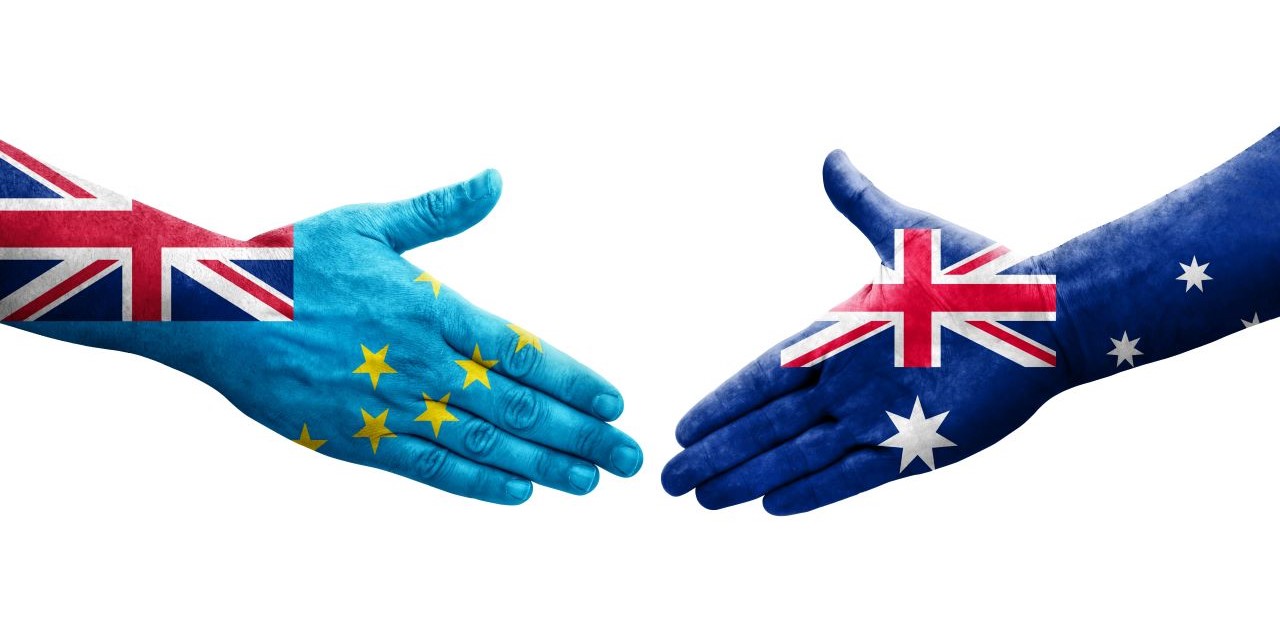Climate Change and Conflict By Taukiei Kitara | 01 August, 2024
Tuvalu Prime Minister Meets with Tuvalu Diaspora to Discuss the New Falepili Union Treaty

Image: Prehistorik/shutterstock.com
On Saturday 13th July, Tuvalu’s Prime Minister Feleti Teo met with the Tuvalu diaspora community in Brisbane, the largest Tuvaluan community in Australia. The visit was the first of its kind. While Tuvalu government leaders regularly travel through Brisbane enroute to high level meetings—in this case meetings in Japan and in the Marshall Islands—and often pay informal visits to diaspora family members, this was the first official meeting with the Tuvalu diaspora community by a Tuvaluan Prime Minister. It was unanimously welcomed by community members, and well attended, not only by Tuvaluans residents in Southeast Queensland, but by a few from further afield such as Bundaberg and Agnes Water. Also in attendance were some Tuvaluan PALM (Pacific Australia Labour Mobility) workers.
The purpose of the meeting was to improve dialogue between the Tuvaluan government and its diaspora in Australia. It was not a media opportunity, but a chance for Tuvaluans to engage in discussions and celebrate Tuvaluan culture.
One topic of discussion was the Australia-Tuvalu Falepili Union Treaty, which involves new arrangements between Tuvalu and Australia for support for climate change adaptation, security, and a new migration pathway for Tuvaluans to Australia. The word Fale Pili means neighbour in the Tuvaluan language. The use of this word in this treaty is significant in the sense that Tuvalu wants Australia to demonstrate that Australia really cares about its neighbours like Tuvalu and that Australia is willing to commit to assisting Tuvalu adapt to the impacts of climate change. Prime Minister Teo explained each of the provisions of the treaty in detail, particularly for those Tuvaluans in the diaspora who had not seen and read the document. The Falepili Union Treaty was the focus of the discussion and the Prime Minister explained that the treaty would allow 280 applications per year to be considered for Australian permanent residency.
Tuvaluan diaspora members voiced their desire to learn more about the new Falepili Union Treaty migration pathway during the Prime Minister’s visit. It was explained that Tuvaluan citizens who were not permanent residents of Australia but were already living in Australia would be eligible to apply for their permanent residency through the forthcoming Falepili Union pathway.
The meeting with the diaspora in Brisbane followed a recent discussion in Tuvalu Parliament that revealed that the government is committed to consultation with Tuvaluan communities about the Falepili Union. Such consultations have commenced in Tuvalu. It is not clear whether there will be another consultation with the Tuvalu diaspora community in Australia that will focus solely on the Falepili Union, following this visit by the Prime Minister.
Prime Minister Teo explained to the community that the Falepili Union is not yet ratified, and there is work to be done before this can happen, by both Australia and Tuvalu. It was explained that there is a provision in the treaty that if the parties are not satisfied with the way the treaty is being implemented, then either Tuvalu or Australia can pull out. The Prime Minister shared that the Falepili Union Treaty is the first treaty of its kind in which Australia is entering into an agreement with Tuvalu, and this has led to other Pacific island nations now expressing their interest in developing similar agreements with Australia. One question, or more a request, to the Prime Minster was: “Would the Tuvalu government consider allocating some of the 280 places for Australian permanent residency to Tuvaluans who are in Australia already and who are not Australian residents?” A second question was: “Would the government allocate some of the 280 visa places under the Falepili Union Treaty to Tuvaluans living in New Zealand who have not got their New Zealand permanent residency or are overstayers”? The Prime Minister acknowledged that such issues are important and that he would discuss this further with his cabinet. He stressed that the Falepili Union Treaty is for every Tuvaluan and anyone can apply, whether living in Tuvalu or overseas, as long as they are a Tuvalu citizen. The Prime Minster emphasised that Tuvaluans who are granted Australian residency would be able to travel between Tuvalu and Australia without any restrictions and no restrictions on how long Tuvaluans with Australian residency stay outside of Australia.
Prime Minister Teo also discussed the Tuvaluan government’s 21 priorities that were introduced as their four year plan earlier this year, just after the new government was elected. There were no comments or feedback from the community regarding the 21 priorities but there was some acknowledgment and words of appreciation from the community regarding the effort and initiative the new government is taking to be more transparent with its plans relating to development. The community hopes that these priorities will be fulfilled within the four-year term of the government and acknowledges that the benefits will not only be for the people in Tuvalu but will also benefit Tuvaluans living outside of Tuvalu.
The meeting culminated with a fatele (Tuvaluan customary performance of song, drumming and dance) and a feast organised by the Niutao community in Brisbane, which is Prime Minister Teo’s fenua (Indigenous community).
Related articles:
This is not climate justice: The Australia-Tuvalu Falepili Union (3-minute read)
Why are new ruling on the law of the sea and climate change matters for Australia and especially our island neighbours (3-minute read)
Rising risks of climate disasters mean some communities will need to move (3-minute read)
Taukiei Kitara is from Tuvalu, and lives in Queensland, Australia. He completed his Masters of Global Development from Griffith University and is an Adjunct Research Fellow at the Griffith Centre for Social and Cultural Research, Griffith University, Australia. He was the President of the Brisbane Tuvalu Community from 2019-2022 and a council member for the Pacific Island Council for Queensland (PICQ).